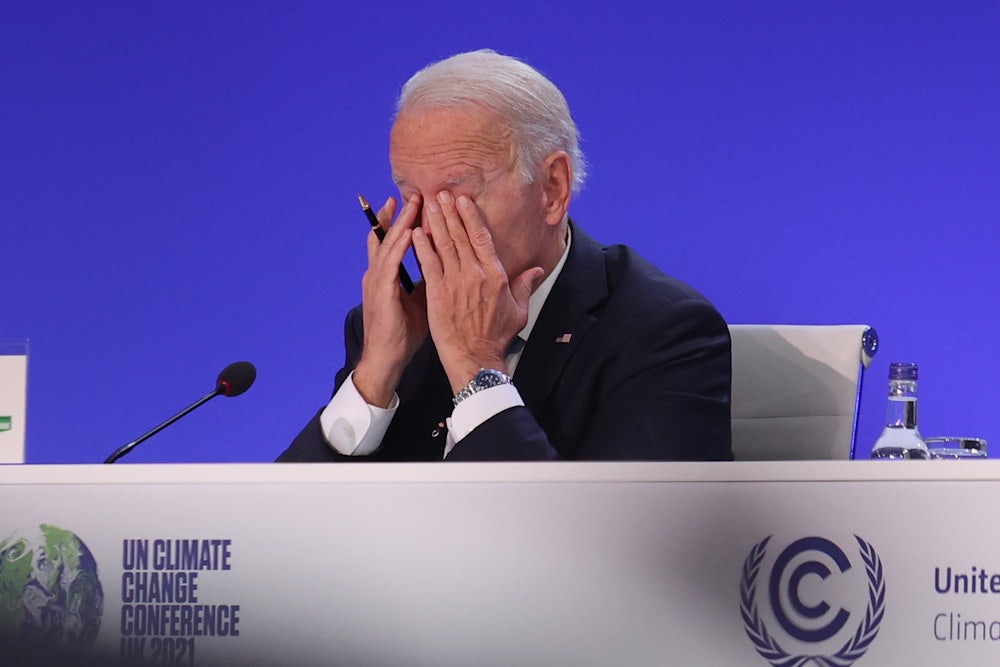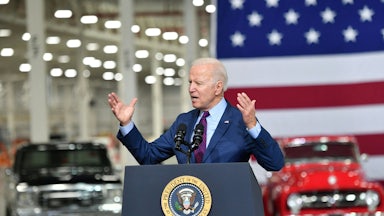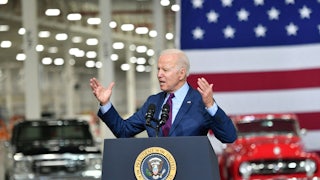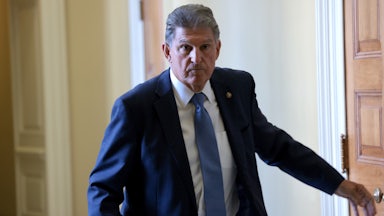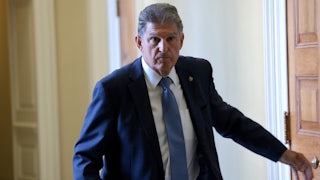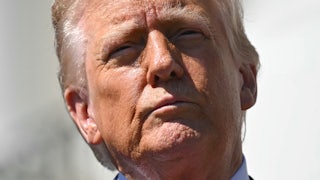“We can keep the goal of limiting global warming to just 1.5 degree Celsius within our reach, if we come together, if we commit to doing our part, of each of our nations, with determination and with ambition,” Joe Biden told the World Leaders Summit gathered at the U.N. climate talks, COP26, in Glasgow on Monday. Back home, the United States didn’t appear to be on the verge of doing any such thing.
Biden had hoped to bound back into the Paris Agreement portraying the U.S. as a climate leader. He wanted to come to Glasgow armed with a reconciliation bill chock full of climate spending. Two days in, he still hasn’t got it. West Virginia Senator Joe Manchin, meanwhile, gave a defiant press conference Monday expressing his willingness to tank the whole thing if progressives don’t pipe down, pass the much smaller and less climate-friendly bipartisan infrastructure bill, and strip whatever Manchin doesn’t like—which includes most climate provisions—out of the reconciliation package. Centrist House members are also grumbling about the cost. Right now, the U.S. isn’t even close to pulling its weight in the climate fight.
That may be a clarifying way to kick off the most important climate talks since the Paris Agreement was forged in 2015: with the realization that, if the world is to keep from warming above 1.5 degrees Celsius (2.7 degrees Fahrenheit), it will likely have to do so without—or even over the opposition of—the U.S. “Our addiction to fossil fuels is pushing humanity to the brink. We face a stark choice,” U.N. Secretary-General António Guterres told the same gathering Monday. “Either we stop it—or it stops us. It’s time to say: enough.”
Saying “enough” to fossil fuels, though, has never been part of even the most ambitious articulation of Biden’s climate agenda. Like other leaders of major oil- and gas-producing states, Biden’s chief talking points on the industry have been about mitigating and removing its emissions—not reckoning with the fact that its very existence is a grave threat. Study after study has shown that a growing, thriving fossil fuel industry simply isn’t compatible with a livable planet—let alone what are now almost unfathomably ambitious 1.5 degree Celsius targets, however much methane emissions happen to be regulated.
“The supposed leader of the free world is still an oil and gas president,” said Jean Su, director of the Energy Justice Program and senior attorney at the Center for Biological Diversity, who’s in Glasgow for the talks. She pointed to the range of actions Biden could take virtually overnight to stem the flow of fossil fuels abroad, like ending fossil fuel leases on federal land, canceling Line 3, and declaring a climate emergency so as to reinstate the 40-year-old crude oil export ban the Obama administration lifted in 2015. Biden yesterday referenced the need for a “sprint” to cut emissions in half but a marathon to transform the energy system. “If we’re talking about his own analogy,” Su told me, “Biden hasn’t even started the race. Without doing that most primary and basic climate action, we can’t start sprinting at all. By failing to act on the fossil fuel extraction agenda, he’s committing climate atrocity. It’s beyond climate denial.”
For much of the world, U.S. climate leadership has always been a shaky idea. U.S. withdrawal from the Kyoto Protocols in 1997 sent the world to the drawing board to figure out a new pact that could meet its standards: to get rid of any binding emissions reductions or financing targets and whitewash talk of historical responsibility that would make the U.S. accountable for its outsize role fueling the crisis. Donald Trump then withdrew from the result of those negotiations—the Paris Agreement—in 2017. Biden has now gotten the U.S. back into the Paris Agreement. But veteran observers of the U.N. Framework Conventions on Climate Change—of which the Paris Agreement talks are a part—say current U.S. climate negotiators still aren’t engaging productively with the international community.
“Claims of U.S. leadership do not pass the test of fair share of climate action needed from the biggest historical carbon emitter. The domestic near-term ambition of cutting emissions remains so teeny-weeny compared to so many developing countries, who have put forth bolder targets despite facing poverty and devastating climate impacts,” said Harjeet Singh, a New Delhi–based senior adviser to the Climate Action Network International, who’s in Glasgow for the talks. “The U.S. continues to block an agreement under the U.N. to help vulnerable communities and countries get financial support to recover from the losses and damages caused by unprecedented droughts, violent storms, and rising seas.”
The U.S. has not come to COP as a climate leader. Maybe it’s time for other countries to stop waiting for that to change.
